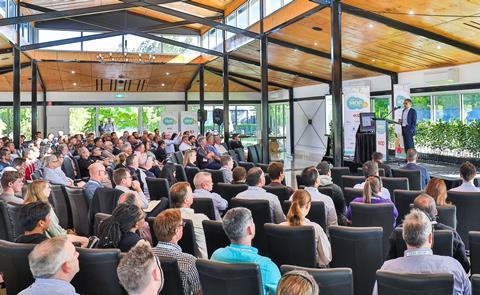The two-day programme will focus on R&D for Australian citrus industry

The latest R&D breakthroughs will headline the Citrus Australia’s inaugural Australian Citrus Congress on 5-7 March 2024.
The event will be held at Novotel Sunshine Coast Resort, Queensland and offer a multi-track conference programme and trade show-style exhibition.
Citrus Australia worked alongside Hort Innovation to develop the conference programme which will focus on research and development (R&D) projects and outcomes transforming the citrus industry.
Hort Innovation chief executive Brett Fifield said the new-look event will provide valuable R&D updates to all citrus industry members, highlighting the work that’s being done to ensure a profitable and sustainable future for the sector.
“As the principal R&D partner of the Australian Citrus Congress, Hort Innovation is looking forward to meeting with the citrus industry and being able to highlight the impactful work being done to support citrus growers,” Fifield said.
“The event will also be an opportunity for us to better understand the current challenges facing the industry, so that we can continue supporting it through future strategic levy investments.”
Fifield will speak in the opening keynote session which will focus on macro trends impacting profitability across the citrus sector, with Fifield to highlight the depth and breadth of R&D investments being made through the Citrus Levy Fund.
Leaders of several Citrus Levy-funded projects will present across the two-day programme.
David Monks of the New South Wales Department of Primary Industries (NSW DPI) will moderate a session on citrus varieties, sponsored by Victorian Citrus Farms. Monks will be joined on stage by global experts in varietal development including Malcolm Smith of the Queensland Department of Agriculture and Fisheries, who will discuss the development and direction of new citrus varieties in Australia and internationally, drawing on his experience delivering the levy-funded Australian Citrus Breeding Program.
A session on the post-harvest sector will examine advancements that are helping produce high quality and safe food for domestic and international consumers. The session, sponsored by Steritech, will be moderated by John Golding of NSW DPI, who leads the levy-funded Citrus Postharvest Program.
“This session will deliver a comprehensive overview of what’s happening in post-harvest and fruit quality management,” Golding said. “Speakers will discuss current and new post-harvest fungicides, developments in storage and maintaining quality through domestic and export supply chains.”
A grower-focused production session will home in on the correlation between improved fruit quality and increased profitability. This session will include presentations from renowned soil health and tree nutrition expert Graeme Sait and NSW DPI’s Tahir Khurshid, leader of the levy-funded Evaluation of New Rootstocks project.
With Australian growers on track to produce over 1.2m tonnes of citrus annually by 2028, export development is an area of priority for the industry. Citrus Australia’s general manager of market development, David Daniels, will discuss opportunities to grow sales in both established and emerging markets, based on his work under the Citrus Market Development, Market Access and Quality project.
The conference programme will round out with an R&D ideation session, which will encourage delegate participation.
Citrus Australia chief executive Nathan Hancock said the conversation will centre on what the next ten years look like for the Australian citrus sector.
“As a whole, the industry has faced some significant challenges over the last few years,” said Hancock. “We’re starting to see signs of prosperity again, but we’d be naive to think more challenges won’t come our way.
“Citrus businesses must continue to adapt to the changing playing field in order to be profitable in the future.
“Through the Australian Citrus Congress, Citrus Australia aims to provide content and networking opportunities for growers to take home some ideas to adapt in their businesses and on their farms.”



